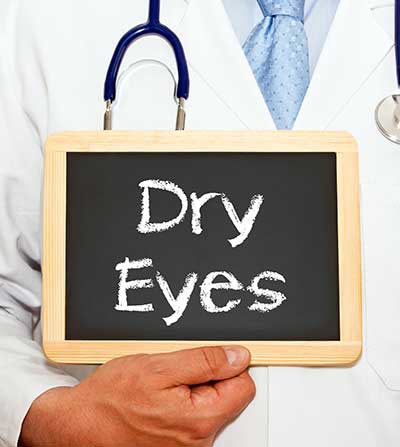Signs and Symptoms or Dry Eye

Persistent dryness, scratchiness and a burning sensation in your eyes are
common symptoms of dry eye syndrome. These symptoms alone may be enough
for your doctor to diagnose dry eye syndrome. Sometimes, the doctor may want
to measure the amount of tears in your eyes using a special paper called a
Schirmer Test.
Some people with dry eyes also experience a "foreign body sensation" – the
feeling that something is in the eye. It may seem odd, but sometimes dry eye
syndrome can cause watery eyes, because the excessive dryness works to
overstiumulate production of the watery component of your eye’s tears
What Causes Dry Eyes?
In dry eye syndrome, the tear glands that moisturize the eye don’t produce enough
tears, or the tears have a chemical composition that causes them to evaporate
too quickly.
Dry eye syndrome has several causes.
- As part of the natural againg process, especially among women over age 40
- As a side effect of many medications, such as antihistamines,
antidepressants, certain blood pressure medicines, Parkinson’s medications
and birth control pills
- Because you live in a dry, dusty or windy climate with low humidity
- If you have air conditioning or dry heating system at home or work
- Insufficient blinking, often with staring at a screen
Dry eyes are also associated with certain systemic diseases such as lupus,
rheumatoid arthritis, rosacea, Sjogrens Syndrome.
Long term contact lens wear, incomplete closure of the eyelids, eyelid disease and
a deficiency of the tear-producing glands are other causes.
Dry eye syndrome is more common in women, possibly due to fluctuations.
Recent research suggests that smoking can increase your risk of dry eye
syndrome. Dry eye has also been associated with incomplete lid closure following
blepharoplasty or after refractive surgery.
Treatment for Dry Eye Syndrome
DES is an ongoing condition that treatments may be unable to cure. The
symptoms of dry eye and usually be successfully managed.
Dr. Bomse frequently recommends lubricant eye drops to alleviate the dry,
scratchy feeling and foreign body sensation of dry eye. Different types of
prescription drops may be needed to provide temporary or more long-term relief.
If you wear contact lenses, switching materials may be helpful. Also, many over
the counter drops cannot be used during contact lens wear. Always check the
label or call the office before using drops with contact lenses in your eyes.
To reduce the effects of sun, wind and dust, wear sunglasses when outdoors.
Wraparound styles offer the most protection. A wide-brimmed hat is also helpful.
Indoors, an air cleaner can filter out dust and other particles from the air, while a
humidifier and add moisture to air that’s too dry because of air conditioning or
heat.
Treating underlying eyelid disease such as blepharitis or Meibomian gland
dysfunction (MGD) is necessary. Dr. Bomse may recommend warm compresses,
an in-office procedure the clear the blocked glands, lid squeezing exercises or lid
scrubs to help restore normal function.
Sometimes, nutritional supplements may be recommended.
Drinking more water may be beneficial.
If medications are the cause of your dry eyes, discontinuing the drug generally
resolves the problem, but this may not be possible. Never switch or discontinue
medications without consulting your doctor.
If you are considering refractive surgery, be aware that dry eyes may increase
your risk for poor healing. Always treat your dry eyes first to ensure a good
surgical outcome.
In most patients, dry eye is multifactorial and requires both acute and chronic
treatment plans.